Table of Contents
ToggleNCERT Solutions Class 10 Science Chapter 5 (Life Processes)
NCERT Solutions for Class 10 Science Chapter 5 Intext Questions
NCERT Solutions Class 10 Science Chapter 5 (Life Processes)
Page Number: 81
Question 1
Why is diffusion insufficient to meet the oxygen requirements of multicellular organisms like humans?
Answer:

Question 2
What criteria do we use to decide whether something is alive ?
Answer:

Question 3
What are outside raw materials used by an organism ?
Answer:

Question 4
What processes would you consider essential for maintaining life ?
Answer:
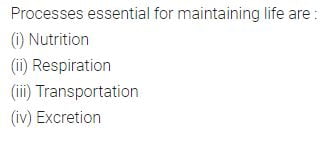
NCERT Solutions Class 10 Science Chapter 5 (Life Processes)
Page Number: 87
Question 1
What are the differences between autotrophic nutrition and heterotrophic nutrition ?
Answer:

Question 2
Where do plants get each of the raw materials required for photosynthesis ?
Answer:

Question 3
What is the role of the acid in our stomach ?
Answer:

Question 4
What is the function of digestive enzymes ?
Answer:

Question 5
How is the small intestine designed to absorb digested food ?
Answer:

NCERT Solutions Class 10 Science Chapter 5 (Life Processes)
Page Number: 91
Question 1
What advantage over an aquatic organism does a terrestrial organism have with regard to obtaining oxygen for respiration ?
Answer:

Question 2
What are the different ways in which glucose is oxidised to provide energy in various organisms ?
Answer:
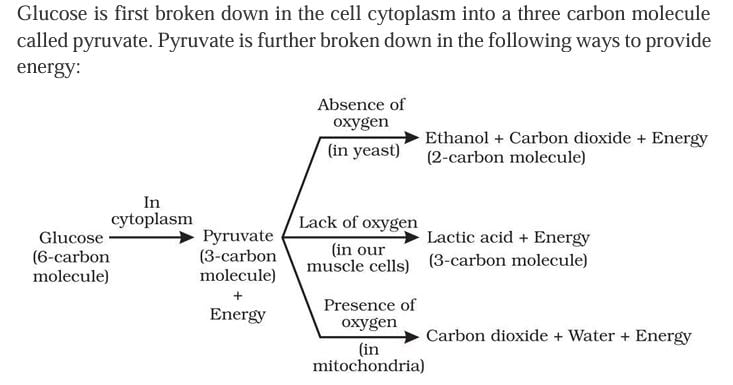
Question 3
How is oxygen and carbon dioxide transported in human beings ?
Answer:

Question 4
How are the lungs designed in human beings to maximise the area for exchange of gases ?
Answer:

NCERT Solutions Class 10 Science Chapter 5 (Life Processes)
Page Number: 96
Question 1
What are the components of the transport system in human beings ? What are the functions of these components ?
Answer:

Question 2
Why is it necessary to separate oxygenated and deoxygenated blood in mammals and birds ?
Answer:

Question 3
What are the components of the transport system in highly organised plants?
Answer:

Question 4
How are water and minerals transport in plants ?
Answer:

Question 5
How is food transported in plants ?
Answer:

NCERT Solutions Class 10 Science Chapter 5 (Life Processes)
Page Number: 98
Question 1
Describe the structure and functions of nephrons.
Answer:




Question 2
What are the methods used by plants to get rid of excretory products ?
Answer:

Question 3
How is the amount of urine produced regulated ?
Answer:

NCERT Solutions for Class 10 Science Chapter 5 Exercise Questions (Textbook Chapter End Questions)
NCERT Solutions Class 10 Science Chapter 5 (Life Processes)
Question 1
The kidneys in human beings are a part of the system for
(i) nutrition
(ii) respiration
(iii) excretion
(iv) transportation
Answer:
Question 2
The xylem in plants are responsible for
(i) transport of water
(ii) transport of food
(iii) transport of amino acids
(iv) transport of oxygen
Answer:
Question 3
The autotrophic mode of nutrition requires
(i) carbon dioxide and water
(ii) chlorophyll
(iii) sunlight
(iv) all of the above
Answer:
Question 4
The breakdown of pyruvate to give carbon dioxide, water and energy takes place in
(i) cytoplasm
(ii) mitochondria
(iii) chloroplast
(iv) nucleus
Answer:
Question 5
How are fats digested in our bodies ? Where does this process take place ?
Answer:

Question 6
What is the role of saliva in the digestion of food ?
Answer:

Question 7
What are the necessary conditions for autotrophic nutrition and what are its by-products?
Answer:

Question 8
What are the differences between aerobic and anaerobic respiration ? Name some organisms that use the anaerobic mode of respiration.
Answer:
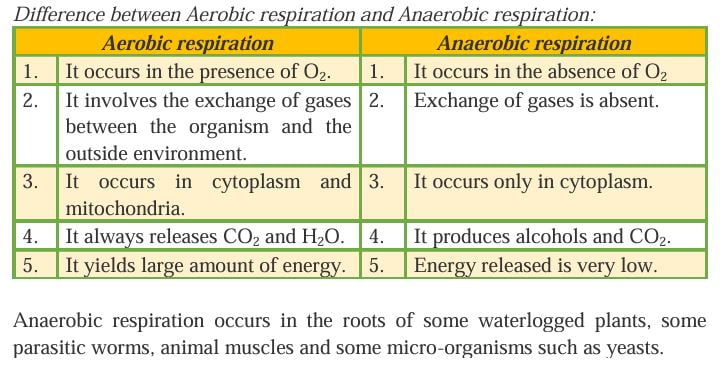
Question 9
How are the alveoli designed to maximise the exchange of gases ?
Answer:

Question 10
What would be the consequences of a deficiency of haemoglobin in our bodies?
Answer:

Question 11
Describe double circulation in human beings. Why is it necessary ?
Answer:

Question 12
What are the differences between the transport of materials in xylem and phloem ?
Answer:
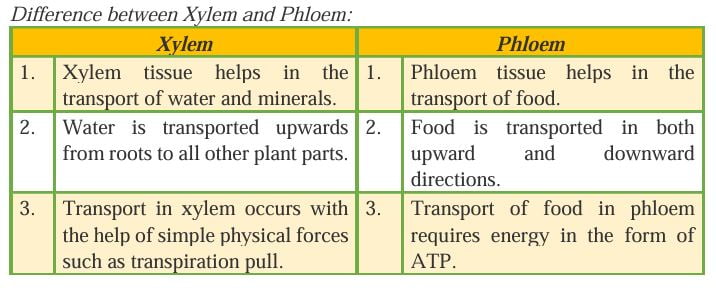
Question 13
Compare the functioning of alveoli in the lungs and nephrons in the kidneys with respect to their structure and functioning.
Answer:

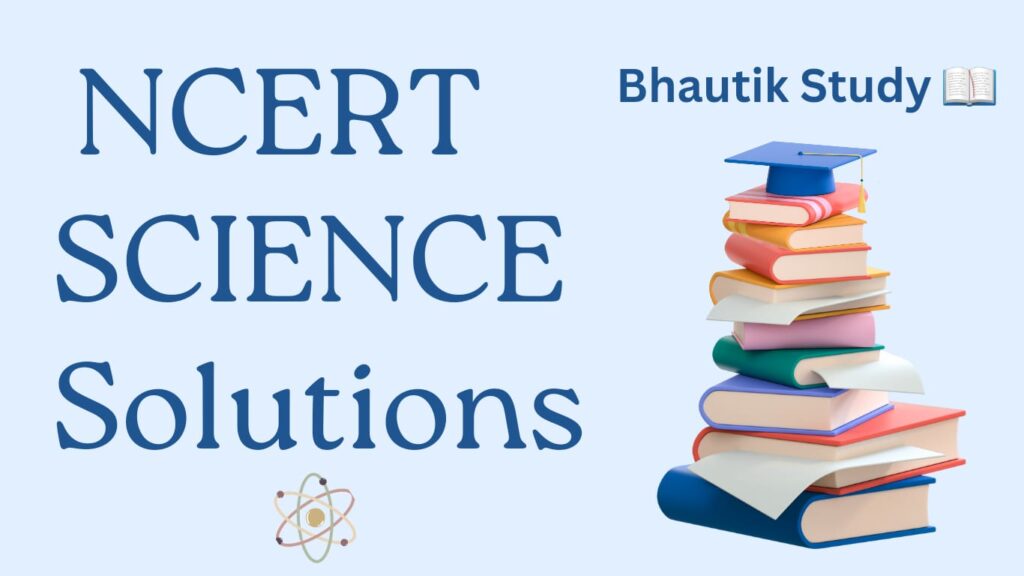
Students can swiftly skim the full chapter at once in NCERT Solutions Class 10 Science Chapter 5 (Life Processes), which is helpful for last-minute study sessions. This chapter’s NCERT Solutions for Class 10 Science were created with the concept-based approach in mind, enabling students to provide accurate answers. This is the most crucial thing to keep in mind for the CBSE exams.
NCERT Solutions Class 10 Science Chapter 5 (Life Processes)
We study the many components that go into a live organism in NCERT Solutions Class 10 Science Chapter 5 (Life Processes). The chapter covers in brief the several functions necessary for respiration, nourishment, material transportation, and excretion of the food that has been digested in order to maintain and support life. The several forms of nutrition, including heterotrophic and autotrophic feeding, are covered in detail. A brief overview of the human digestive process is provided, covering food ingestion, food passage through the alimentary canal, food absorption, and the point at which digested food is ready for excretion.
Students learn about the two types of respiration in this chapter: anaerobic respiration, which occurs when oxygen is not present in the body, and aerobic respiration, which occurs when oxygen is present and breaks down organic components. The circulatory system in humans is responsible for the movement of several substances, including food, oxygen, carbon dioxide, and other materials. This system is described. Additionally covered are the many components of the circulatory system, including blood, blood vessels, and the heart. This chapter clarifies the many roles played by the excretory organs as well as their general structure.
By using the Bhautikstudy.com NCERT Solutions Learning App on your smartphone, you can access free conceptual videos and LIVE master classes. Learn the NCERT Solutions Class 10 Science Chapter 5 (Life Processes) NCERT Book Solution in detail from knowledgeable science instructors.
Important Elements of NCERT Solutions Class 10 Science Chapter 5 (Life Processes)
Students can improve their exam preparation for the CBSE Class 10 by using NCERT Solutions.
In order to help students better understand concepts, this chapter provides a step-by-step explanation.
Wherever needed, diagrams are included to aid in visual learning.
As is to be anticipated in the CBSE exams, the solutions are clear and concise.
NCERT Solutions Class 10 Science Chapter 5 (Life Processes) have been completed in accordance with the CBSE curriculum and the NCERT textbook.
NCERT Solutions Class 10 Science Chapter 5 (Life Processes) You can find all the information you need about NCERT Solutions Class 10 Science Chapter 5 (Life Processes) in this page. Since biology is a significant component of the medical industry, students who intend to pursue a career in that discipline may find this page useful. Candidates who are well-versed in life processes and have mastered the NCERT Solutions Class 10 Science Chapter 5 (Life Processes) will find it easy to pass competitive exams such as JIPMER, NEET, and AIIMS.
Have you looked over the Important Questions about the Life Process that were included in the earlier Board Papers?
Since a student’s opportunities are mostly determined by the grades they earn on the board test, NCERT Solutions for Class 10 are crucial in establishing a child’s destiny. In order to provide a one-stop shop for answers to all maths, science and social science problems, our subject professionals have created Class 10 NCERT Solutions. These Solutions for Class 10 NCERT textbooks provide a solid basis for learning all of the concepts in Maths, Science, and Social Science for students who wish to perform well on the NCERT Solutions Class 10 Science Chapter 5 (Life Processes). Learning is made easy and apparent by the NCERT Solutions’ clear descriptions, well-illustrated graphs, and solved examples.
All of the practice questions from the NCERT Math textbook are included in the NCERT Solutions for Class 10 Math. Our highly qualified topic professionals have offered these maths answers to help students get ready for their exams. These answers will help students understand the concepts covered in the Class 10 Maths syllabus more fully. By working through the NCERT Class 10 Maths textbook problems, students can evaluate their degree of readiness and conceptual understanding.
Students should work through the Class 10 Maths NCERT Solutions after completing the curriculum, as they provide a good amount of practice with several questions from each unit. Seek clarification from these solutions if you’re having trouble solving the issues, and make use of them as additional resources and study aids. In line with the objectives of the textbook, all NCERT Solutions for Class 10 Maths in Hindi and English are written in an easy-to-understand and clear manner. In order to perform well on the Board exams, students are advised to download and use these solutions frequently. In order to make appropriate preparations, students need to understand each of the steps listed in the answers.
NCERT Solutions Class 10 Science Chapter 5 (Life Processes)
Class 10 NCERT Solutions Science aids students in understanding difficult ideas and gets them ready for the Class 10 board exam. These NCERT Science Solutions can be used by students to evaluate their performance and pinpoint their strong and weak points. Additionally, these solutions aid in your thorough comprehension of the subject, which is essential for tests. Students who want to succeed in science need to fully understand all of the topics and ideas that are taught. Because the responses are given in simple terms, students find it easier to learn from them.
All of the NCERT Solutions Class 10 Science Chapter 5 (Life Processes) solutions have been created by our subject matter experts in accordance with the NCERT Solutions Class 10 Science Chapter 5 (Life Processes). It facilitates understanding and application of concepts in Biology, Chemistry, and Physics. Students who are struggling to finish difficult problems might greatly benefit from the Hindi and English NCERT Solutions for Class 10 Science. To do well on the Class 10 Board test, it is advised that they practise these answers frequently. It is thought to be the best study aid for efficiently getting ready for exams.
Given that the CBSE has prescribed the NCERT Solutions Class 10 Science Chapter 5 (Life Processes) in accordance with the syllabus, they provide ample preparation for the Board exam. The topics in each chapter are taught in a way that makes them easy to understand and retain, so you have a better chance of passing the test. These solutions cover all of the important themes. The best study guides for getting ready for the test are these NCERT Solutions. Here are a few instances of how these answers support exam preparation.
Rehearsing a lot of the questions from every chapter improves your comprehension.
NCERT Solutions for Class 10 help you become more knowledgeable and unambiguous.
These solutions are excellent for determining your advantages and disadvantages.
To perform well on tests, you must concentrate on your areas of weakness.
Exam questions often follow the same style as workout tasks.
To fully understand the material, it is imperative that you carefully go over the answers in each chapter.
NCERT Solutions Class 10 Science Chapter 5 (Life Processes) are essential for board exam performance.
It’s critical to comprehend these solutions thoroughly if you want to do well on board exams.